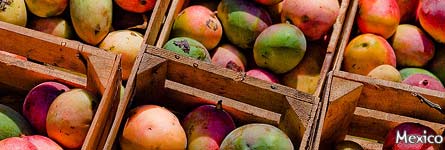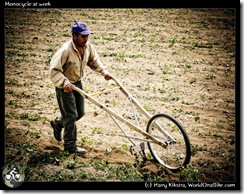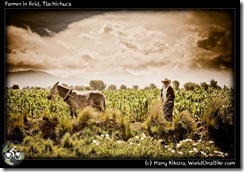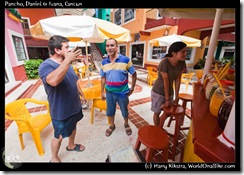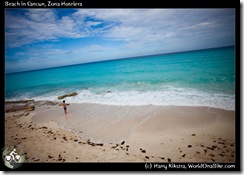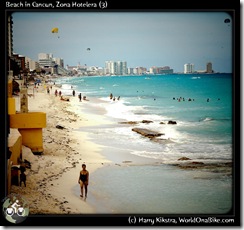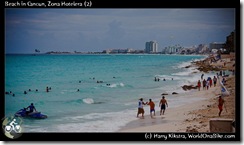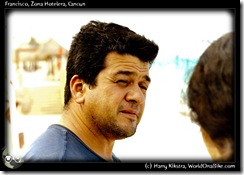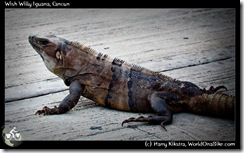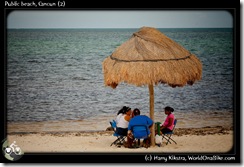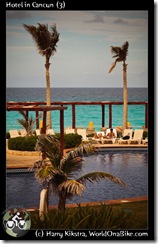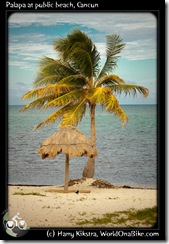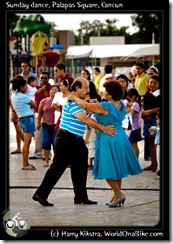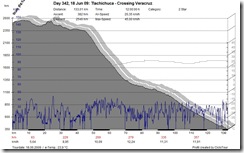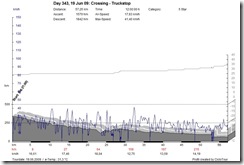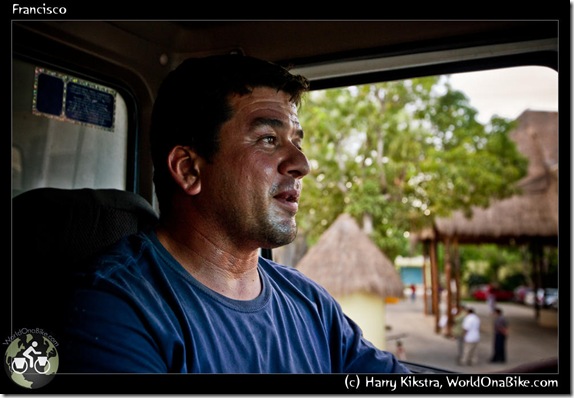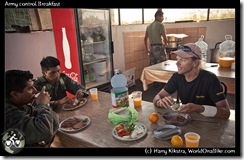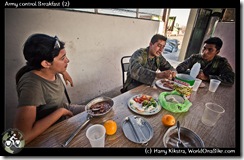Day 342-346, 18-22 June 09: Elections, downhill and to Cancun: World-in-a-Truck
September 22, 2009 by Harry
Filed under Central Mexico, Mexico, North America, Trip reports, Yucatan Peninsula
18 June 2009: Election tricks, graffiti & handwork
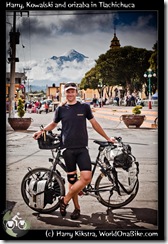 We did a quick tour around the central Plaza in Tlachichuca for some Wi-Fi search and some posing for pictures. I noticed a huge truck unloading hundreds of boxes with a growing crowd gathering around.
We did a quick tour around the central Plaza in Tlachichuca for some Wi-Fi search and some posing for pictures. I noticed a huge truck unloading hundreds of boxes with a growing crowd gathering around.
The boxes contained live chickens and were handed out to the villagers. The magazine salesman that had just treated us to some tacos viewed the scene with a look of disgust.
 “It is the PRI, buying votes. People sell their right to vote for the short term benefit of a chicken. Afterwards they will endure another 4 years of suppression by the rich folks that run the party.”
“It is the PRI, buying votes. People sell their right to vote for the short term benefit of a chicken. Afterwards they will endure another 4 years of suppression by the rich folks that run the party.”
Welcome to the Mexican elections, where votes are bought with live chickens!
 We had already seen signs of the election everywhere. Mexicans in general seem to have a morbid fear of white surfaces, as every wall, of every house, compound or fence always contains graffiti, without exception.
We had already seen signs of the election everywhere. Mexicans in general seem to have a morbid fear of white surfaces, as every wall, of every house, compound or fence always contains graffiti, without exception.
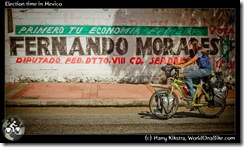 Some times it is just marketing, with the name of the shop or the biggest brands they sell, many times it is just defacing stupid graffiti.
Some times it is just marketing, with the name of the shop or the biggest brands they sell, many times it is just defacing stupid graffiti.
But in the last months before the general elections in July, the majority of all walls have been taken over by the election marketeers promoting their candidates with populist slogans:
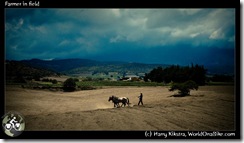 “Your Household Economy comes first!”, “Only we want more jobs for you!” and the classic “Cheaper gasoline for everybody!”.
“Your Household Economy comes first!”, “Only we want more jobs for you!” and the classic “Cheaper gasoline for everybody!”.
We cycled through fields of corn, where old famers were working without any motorized means. All waved when we passed them, on our way to one of the biggest downhills of our entire journey…
After rounding the Ciudad Serdan and climbing some minor hills, we reached the main highway again. The tollbooth attendants did not even see us and so we found ourselves back on the ‘Quota’!
From the highlands to sea level: 400m up, 2500m down in 133km!
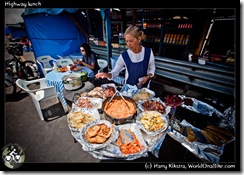 After a quick roadside lunch we started our descent. It was not as relaxed as imagined beforehand as the road was busy and the shoulder filled with rocks and debris of tires and other car parts. Worst of all, we headed into a chilly thick fog, limiting the view in front and behind us to about 40 meters, so we had to brake all the way, wearing our reflective jackets for safety and our rain jackets for warmth.
After a quick roadside lunch we started our descent. It was not as relaxed as imagined beforehand as the road was busy and the shoulder filled with rocks and debris of tires and other car parts. Worst of all, we headed into a chilly thick fog, limiting the view in front and behind us to about 40 meters, so we had to brake all the way, wearing our reflective jackets for safety and our rain jackets for warmth.
The drop-off is so steep that when the highway had to be expanded due to increasing traffic, they basically had to built a new highway as the existing one could not be broadened in most places. The only times when there was some extra room, long emergency gravel pits were built, to save truckers going down with faulty brakes.Fortunately when going down we followed the original one, which went just straight down instead of up, down, around and over like the new variation.
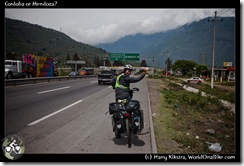 Ivana wanted a picture with the turn-off to Cordoba and Mendoza, both two cities near her province in Argentina and soon after we got the first of several flat tires.
Ivana wanted a picture with the turn-off to Cordoba and Mendoza, both two cities near her province in Argentina and soon after we got the first of several flat tires.
During the downhill Ivana had not managed to avoid al exploded tires and her tires were punctured with several thin but strong parts of steel wire that strengthen the truck tires. Fixing tires on the side of a busy highway is not my favourite thing to do, but there was no other option.
We had lost enough altitude to be in the warmer air of the tropics again. We also got treated to our first heavy tropical rain shower. Actually, when thinking about it, it was the first rain since Central California, USA!
The slope eased, but still we were going down. The view of mighty Pico de Orizaba must be wonderful from this side, but all we could see behind us was a big pile of tropical clouds. We ended our day after 133km, about 4 flat tires and 2500m of downhills in a wet garden next to the highway, with mangos falling from the trees and chickens scaring Ivana.
19/20th June: the long ride to Cancun: World On a Truck
The downhill had ended and we rollercoastered to the junction of the toll roads. Ahead was Veracruz, we turned right towards the east, as we had to get to Cancun with a few days, so we needed some good place for our hitchhiking.
It took about 50km, but we found a gas station where we could ask refuelling pickups for a ride. Then things went fast.
The first ride took us about 200km down the road. We cycled a few minutes to a toll booth and got another ride quickly, which took us 60km. When we left them we noticed a big truck we had seen before. The friendly driver, who had waived at us when he had passed us before, asked us where we were going.
We replied that we were trying to get rides to get North-East.
“I am going to Cancun, want to join?”.
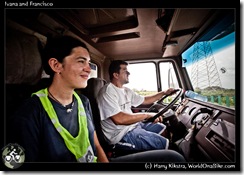 Cancun! It still was about 1100km/700miles away. We introduced ourselves properly to Francisco, a gentle man who runs a moving company from the border with Texas. He has a fleet of about 20 trucks and regularly drives himself as well. His truck was already half empty, with 2 loads left to drop off: one in Merida and one in Cancun!
Cancun! It still was about 1100km/700miles away. We introduced ourselves properly to Francisco, a gentle man who runs a moving company from the border with Texas. He has a fleet of about 20 trucks and regularly drives himself as well. His truck was already half empty, with 2 loads left to drop off: one in Merida and one in Cancun!
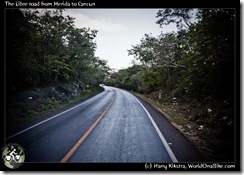 We put our bikes in the back and joined him in the cabin for a long ride to the Yucatan peninsula. After a roadside dinner he parked the truck at a truck-stop and while he slept in the cabin, we slept in the back of the truck, inside the tent against the mosquitoes, but the sweaty heat kept us awake.
We put our bikes in the back and joined him in the cabin for a long ride to the Yucatan peninsula. After a roadside dinner he parked the truck at a truck-stop and while he slept in the cabin, we slept in the back of the truck, inside the tent against the mosquitoes, but the sweaty heat kept us awake.
As the toll roads are too expensive, Francisco took the ‘libres’, meaning extra kilometres and much extra traffic. We slowly passed through the states of Tabasco & Campeche and ended up in Merida. The city is known for it beautiful centre, but we had to unload the possessions of a family that had worked in the US for a while in a less scenic part of town, where the roads were littered with trash.
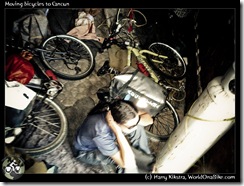 Francisco hired a few guys at the entrance of the city to help us unload in the heat. After getting paid, they bought 6 bottles of beer, which were emptied and thrown out of the window before we could take them back to where we had picked them up.
Francisco hired a few guys at the entrance of the city to help us unload in the heat. After getting paid, they bought 6 bottles of beer, which were emptied and thrown out of the window before we could take them back to where we had picked them up.
It was time to cross the Yucatan state. There is a huge and expensive new quota, so we took the dark and windy libre instead. The road passes through every little town and we had to stop hundreds of times to carefully cross the many ‘topes’, speed bumps.
We arrived late at night but 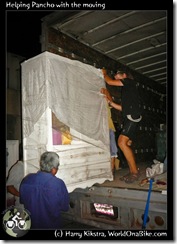 still had one load to deliver before we could find a place to sleep.
still had one load to deliver before we could find a place to sleep.
After we finished 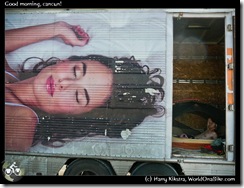 Francisco parked the car in the centre and went to sleep in a friends house, while we erected the tent again, inside the truck.
Francisco parked the car in the centre and went to sleep in a friends house, while we erected the tent again, inside the truck.
We had been rushing the past weeks, but now we had made it to Cancun a week earlier than planned. It took a huge load off our shoulders as we now had some time to check out the city and prepare the visit of our mums.
Cancun
Francisco came back to his truck in the morning, and his friend Daniel invited us to come over and stay in his house. We had friends in Cancun, but as we had arrived so quickly, we had not been able to contact them and gladly accepted Daniel’s offer.
He not only put us up for the night, but also gave us some tours, which helped a lot to understand the city. We visited the touristic places as Francisco had to buy some jewellery for his wife and drank some “raspados”, shaved ice with sweet fruit flavours.
Cancun proper: the beach!
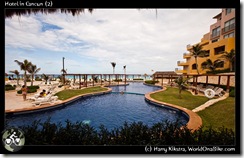 The city were we were is actually not the Cancun that is so famous. The downtown area is where the people live and go for their Sunday dance, the tourists go to a 25km/16mi long peninsula, totally covered with big expensive hotels, clubs and restaurants.
The city were we were is actually not the Cancun that is so famous. The downtown area is where the people live and go for their Sunday dance, the tourists go to a 25km/16mi long peninsula, totally covered with big expensive hotels, clubs and restaurants.
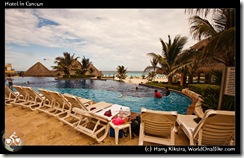 Though all beaches are public and thus open to everybody by law, in practice it is very hard to get to them, as the hotel properties are private and they are all built next to each other.
Though all beaches are public and thus open to everybody by law, in practice it is very hard to get to them, as the hotel properties are private and they are all built next to each other.
Daniel had worked in the hotel business before and took us to see the “Zona Hotelera”. We visited a few of the smaller public beaches, with did have easy access, but we also checked out a large hotel. It was something we will never be able to afford, but it was fun to pretend ![]()
Kowalski! Status report!
All is well. We will park our bikes soon as our mums will arrive and we will be semi-proper tourists for a while. But still there are plenty of things to show, so stay tuned…
1000 Americans: Francisco, Mexico
September 22, 2009 by Harry
Filed under 1000 Americans
Francisco –Pancho for friends- is a gentle man who runs a moving company, near the border with Texas.
He has a fleet of about 20 trucks and regularly drives himself as well and knows every road in Mexico.
Day 322-324, 29-31 May 2009: Hospitals, drunk rides and beach camps
September 12, 2009 by Harry
Filed under Central Mexico, Mexico, North America, Tips & Tricks, Trip reports
29th May 2009: Boca de Apisa – Maruata: 30km cycling, 2 rides, 3 hospitals, free breakfast, lunch and campsite on the beach
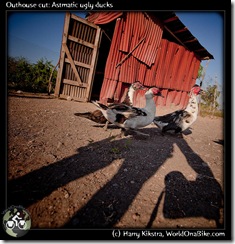 Ivana has a problem with birds. When they fly far away or sing cheerfully in the morning, she loves them, but when they get within her personal space they scare her. So when she had to go to the outhouse, where not only a toilet, but also half a dozen very ugly asthmatic ducks were to be found, she called in the troops.
Ivana has a problem with birds. When they fly far away or sing cheerfully in the morning, she loves them, but when they get within her personal space they scare her. So when she had to go to the outhouse, where not only a toilet, but also half a dozen very ugly asthmatic ducks were to be found, she called in the troops.
To chase the ducks away I walked around the toilet, but suddenly the rotten wood bottom gave away.
I did not know how deep the hole was nor what I would find inside, but as gross scenes from Slumdog Millionaire flashed through my mind, I instinctively held on to the side of the outhouse. 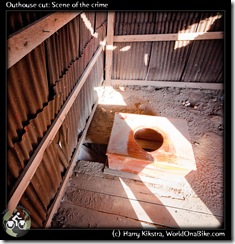
Unfortunately whomever build this construction had decided at some point that it would be better to use nails that are too long, rather than not long enough and my arm got stuck on the end of a nice long and rusty one. As I was still gravity-assisted and going down, it ripped my skin open, holding on to a few cm (1”).
While the bleeding slowly started I walked back out towards Ivana and told her I had cut my arm. The farmer had just come in as well and told us that the army checkpoint on the nearby road had a small hospital, so off we went.
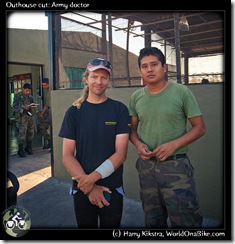 The Army doctor took a look and took me outside to clean the wound thoroughly with a healthy dose of pure stinging alcohol and a lot of pressure. As a small part of the skin was missing, he said that stitches probably would not work. He covered it with bandages, gave me some antibiotics and recommended to get a tetanus injection soon. Next patient please.
The Army doctor took a look and took me outside to clean the wound thoroughly with a healthy dose of pure stinging alcohol and a lot of pressure. As a small part of the skin was missing, he said that stitches probably would not work. He covered it with bandages, gave me some antibiotics and recommended to get a tetanus injection soon. Next patient please.
His fellow soldiers –they check cars and trucks for weapons and drugs- were interested in our trip and when we came back after packing our bikes they invited us for breakfast. We had had our breakfast half an hour before, but a real Bike Traveller never declines food.
We got some tortillas and beans, some meat and fresh juice, served with some nice chats about their work and our trip. To top it off they brought in a chilled guanabana, a large fruit with white flesh that was incredible tasty.
Even though I had some tetanus shots over a year ago in Argentina, a rusty nail in an duck-filled outhouse appeared to me the ultimate test that I did not want to fail, so it seemed like a wise idea to get another shot; there should be a hospital in the small village down the road.
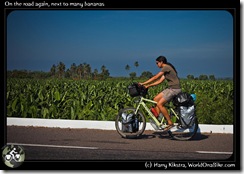 The village turned out to be quite big, noisy and polluted and off the road, but with some help we found the hospital, where I was given the tetanus shot right away. Back to the road again, through a nice flat section lined with banana trees.
The village turned out to be quite big, noisy and polluted and off the road, but with some help we found the hospital, where I was given the tetanus shot right away. Back to the road again, through a nice flat section lined with banana trees.
The next section was not just very hilly, but also known for its bandits and drug-traffickers, who use the small beaches on the rugged coasts to land their smuggling boats. We had planned to get a ride through this section as all the mafia apparently had attracted road-side robbers, attacking vehicles on the quiet road.
First we had to find a good place to hail a pick-up for a ride:
- The perfect spot is near a ‘tope (toh-pay)’, the annoying bumps that are placed on the road to slow down traffic. Cars have to almost stop here and it is easy to ask for a ride.
- If you are on a Quota/toll road, then the toll-both is perfect as well, assuming the guards let you stand there to ask.
- Near a corner, as most (not all) vehicles slow down in a curve, and we can see in time if it is a car or a full pick-up truck as it is no use to stop a car or a pick-up without space for our bikes.
- With sufficient open space for our bikes to be parked near the road and for the car to brake and pull-out.
- Not in a zone known for carjacking, drug trafficking & highway robbers as hitchhikers will be considered possibly dangerous and the cars offering a ride might be as well.
None of the above were available and while looking for them, the road started climbing without mercy. My arm hurt a lot when pulling at the handlebars at steep sections as there was tension on the fresh wound. Ivana’s knee was hurting again as well, so we just started asking passing cars while pushing our bikes up the steep slopes.
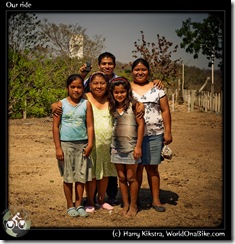 To our surprise a young girl, alone in a big pick-up, stopped and took us and our bikes. We picked her brother up on the way and they took us to their house, where their mum immediately invited us for lunch, treating us to quesadillas and avocado, yum!
To our surprise a young girl, alone in a big pick-up, stopped and took us and our bikes. We picked her brother up on the way and they took us to their house, where their mum immediately invited us for lunch, treating us to quesadillas and avocado, yum!
We could have camped with them, but wanted to get a bit further, so we headed back to the main road and pointed our thumbs towards the sky near a small road-shop.
After several hours of trying, alternating turns in the hot sun, a car truck stopped that could take us to Maruata, which sounded fine to us. What was less fine was that several cases of beer were emptied during the trip and while the road was curvy and bumpy, the speed picked up considerably.
We were sitting in the back with our bikes and were relieved when we arrived near the small town. The first thing we noticed was a huge new building, that turned out to be a newly-opened hospital. Perfect timing, as I wanted to change my bandages and check if my cut had not been infected. We walked in the near-empty building. It was dark as the night-nurses did not know yet where the main light switches were.
A friendly nurse cut away the bandages, took an interested glance at the nasty-but-not-infected-looking wound and then started scrubbing it with half a bottle of iodine using all of her force, suddenly looking a lot less charming.
While I was painfully getting cleaner than the brand new hospital floor, a 14 year old girl walked in crying, fully pregnant and about to deliver. We both looked at her and her crazy mother (or grandmother?) that just laughed like nothing was wrong in this picture. Again I realized the luxury that my so-called ‘problems’ would almost always be smaller than those seen around me.
When checking the prescription the doctor had written out for me, we noticed it was the same as the antibiotics we already had and so we left the 3rd hospital today without paying anything. All the treatments including the tetanus injection had been free of charge. Not just for me as a lucky tourist, but for everybody. Only if I had wanted to buy medication, I would have had to pay. How is that for a ‘developing country’?
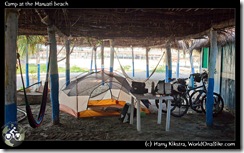 We cycled safely through the dark towards the beach on a bumpy trail, thanks to our headlights on our Santos bikes. Maruata beach is actually quite famous; for the surf and the turtles and it is simply pretty.
We cycled safely through the dark towards the beach on a bumpy trail, thanks to our headlights on our Santos bikes. Maruata beach is actually quite famous; for the surf and the turtles and it is simply pretty.
Now it was dark, but a few guesthouses and restaurants offered some light as well as some food and free camping. A couple of friendly salesmen that also had stopped here for the night offered to pay a room for us, but we explained that we rather be outside in our tent, as it would be cooler and without mosquitoes.
We fell asleep while the surf provided a lazy rhythm to the lightshows of the fireflies. Wat een dag!
30 May 2009: Maruata beach – Caleta de Campo: crazy hills, drunk rides and more beach
Our friendly host suddenly requested money for the free camping after all, but gave in after a brief protest from our side. We headed back up to the road and started cycling, again looking for a great place for our next ride.
There was none. This section of road was insane, a succession of incredibly steep climbs, directly followed by deadly downhills through blind corners on a narrow road with temperatures going through the roof. Rinse and repeat several dozen times. We now realized why the distance on the map had seemed wrong, but was right after all: if you could take this road and stretch it out, it would cover the true distance at least twice.
It would destroy the knees of Lance Armstrong, if he were able to get a fully loaded bike up here. So likely it would ruin ours as well and as the doctor had ordered rest for my arm we resorted to stopping pick-ups to force our next ride through this overheated madness.
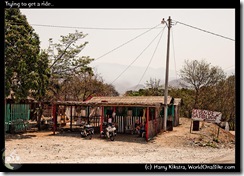 IOf course few people use this road for long-distance and it would take 5 separate rides that day before we would get to our next stop: one friendly guy, a drunk couple that picked us up twice, a trio of young girls in an expensive new truck and a nice man that turned out to be a drunk idiot as well, tossing out an empty beer can out the window every few minutes.
IOf course few people use this road for long-distance and it would take 5 separate rides that day before we would get to our next stop: one friendly guy, a drunk couple that picked us up twice, a trio of young girls in an expensive new truck and a nice man that turned out to be a drunk idiot as well, tossing out an empty beer can out the window every few minutes.
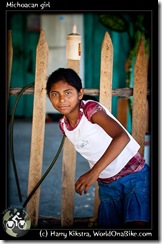 We still managed to cycle about 50km ourselves that day and even spend our lunchtime waiting several hours for a ride at a small place in the middle of nowhere where small kids were cycling downhill on a bike without brakes without wearing shoes, for fun.
We still managed to cycle about 50km ourselves that day and even spend our lunchtime waiting several hours for a ride at a small place in the middle of nowhere where small kids were cycling downhill on a bike without brakes without wearing shoes, for fun.
There we also got to chat with Orlando, an 80-year old Mexican that had great knowledge about geography and mountains all over the world. He was clearly very well educated, but now he just waited in the shade for his next customers: in exchange for free food and lodging, he sold gasoline for a local lady. Using his mouth and a hose he transferred the fuel into the expensive cars that stopped by, realizing that fuel stations were a rarity on this road.
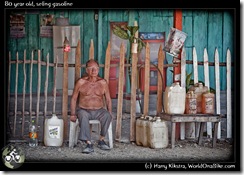 We saw his eyes gleam when we told him about our trip, but our heart broke every time he spent minutes coughing and spitting after every filling-up of yet another car filled with rude people. It was a sad sight, especially with the wrongly spelled ‘Cevende Gasolina’ sign on the road behind him (‘Se vende Gasolina = Gas for sale).
We saw his eyes gleam when we told him about our trip, but our heart broke every time he spent minutes coughing and spitting after every filling-up of yet another car filled with rude people. It was a sad sight, especially with the wrongly spelled ‘Cevende Gasolina’ sign on the road behind him (‘Se vende Gasolina = Gas for sale).
The last drunk ride had dropped us off in a beach town and a steep but paved road dropped us right onto the beach. Ivana was exhausted so I went to check the places to camp. 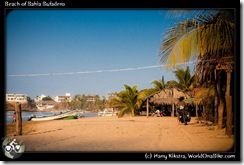 All the restaurants wanted cash to camp on their empty properties, even if we would buy dinner there. In the end the only place that would let us camp, was one that had the kitchen closed.
All the restaurants wanted cash to camp on their empty properties, even if we would buy dinner there. In the end the only place that would let us camp, was one that had the kitchen closed.
So we settled for a few emergency noodle soups and bought some cold beers to thank our hosts and quench our thirst Next door a children’s party hit a piñata (as well as one unfortunate small guest) to smithereens while thousands of small to medium-sized crabs that had appeared out of nowhere crawled around my feet, headed for the ocean. World On a bike in Mexico…
31 May 2009: Caleta de Campo beach – Uruapan: 80km + 200km in rides, up to the highlands!
The road had turned sane again and as our injuries felt better, we decided to make some more miles by ourselves again. The coastal road was a lot nicer here, with a fresh breeze coming up from the pretty beaches and hills that were doable for mortals.
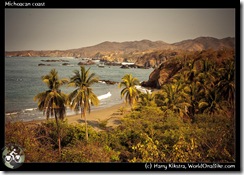 We did try to use ‘lunch’ -the hottest time of the day- for getting another ride as we were now less than one month away from our deadline in Cancun, so all bits would help.
We did try to use ‘lunch’ -the hottest time of the day- for getting another ride as we were now less than one month away from our deadline in Cancun, so all bits would help.
The small town was full of pick-ups, but it turned out that was just for the local fiesta, which in itself turned out to be a cockfight, illegal in the USA, a quite regular Sunday outing in Mexico.
Ivana talked to and helped some local kids that were trying to inflate a bicycle tire. Soon after they came up to me with their broken derailleur and a handful of parts. Though it had been a while since I fixed a derailleur as our Rohloff system has internal gears instead, I managed to turn into Bicycle Repairman and got all the parts connected and the gears going again.
I noticed that the initial joy on the little guy’s face had suddenly disappeared.
‘Comocuantovaser?’, he spoke swiftly but softly with a worried look on his face.
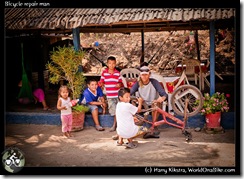 Como cuanto va ser, or ‘how much is it going to be?’, we translated. Poor guy, he was afraid that the gringo would charge him a lot for fixing his bike.
Como cuanto va ser, or ‘how much is it going to be?’, we translated. Poor guy, he was afraid that the gringo would charge him a lot for fixing his bike.
I explained him that it was free and that cyclists should always help each other out when needed and his face cleared up to reveal a bright smile.
Closer to the larger city of Lazaro Cardenas we got 2 short rides across the busiest sections and they dropped us off at the new ‘quota’, the toll road that was not on our 2 maps. We cycled some more along the road, assuming we would at some point encounter a tollbooth.
We noticed that there was almost no trash near the road, a clear sign that it was just opened recently, as all other roads in Mexico are lined with plastic, glass, paper, more plastic and styrofoam. As friendly as the Mexicans are, their own environment is one thing they do not seem to care about. When cycling you really see the extent of the influence of plastic waterbottles & chips: free roadside marketing that shows that thousands of Coca-Cola drinkers have no respect for nature, not even their own.
When we finally got to the crossing where the booth was, some soldiers advised us not to go further east, but inland instead to visit Morelia and to enjoy the cooler air. We looked at our map and decided that it might be a good idea to head for the fresh highlands instead of following the bumpy hot coastline to Acapulco first.
The first pick-up Ivana asked already had some bags in the back, but still agreed to take us all the way to Uruapan. And so within minutes we speeded up on a brand-new road through the steep hills of the highlands, ending up nearly 1800m higher in the fresh world capital of avocado’s.
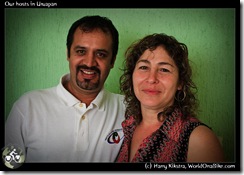 The driver and his wife had planned to drop us off near a gas station, but intrigued by our little business-card they decided to invite us in their house instead.
The driver and his wife had planned to drop us off near a gas station, but intrigued by our little business-card they decided to invite us in their house instead.
We had a pleasant evening with the family Mendez. Again we ended up staying freshly showered and well-fed in the clean beds of new friends, wondering what the highlands of Central Mexico had in store for us…


